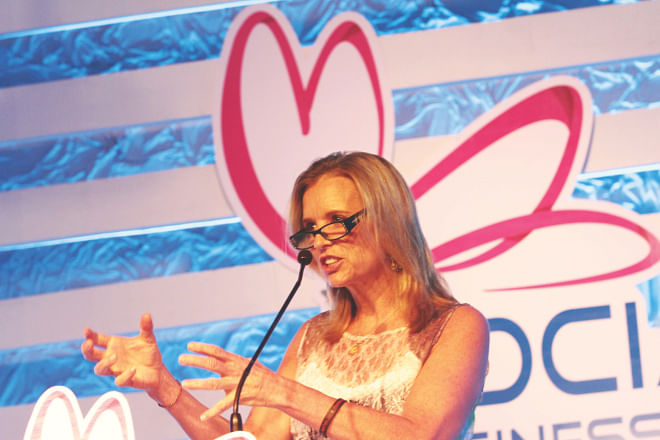The challenges before justice
The challenges before justice
Int'l rights activist worried at extrajudicial killings, forced disappearances in Bangladesh

A leading international human rights activist yesterday expressed deep worries at enforced disappearances, extrajudicial killings and the impunity enjoyed by law enforcers in Bangladesh.
While presenting a list of challenges the country faces today, Kerry Kennedy, president of the US-based Robert F Kennedy Centre for Justice and Human Rights, said the first challenge was securing freedom of expression.
She rang an alarm bell about the challenge of obtaining justice when security forces act with impunity, enforced disappearances and extrajudicial killings go unsolved, torture of victims is routine and prosecutions can be politically motivated.
Daughter of the late US senator Robert Francis Kennedy, who was murdered in June 1968 as he campaigned for the Democratic Party's presidential nomination, and niece of president John F Kennedy, who was assassinated in November 1963, and the late Senator Edward M Kennedy, Kerry Kennedy was addressing the opening ceremony of the 5th Social Business Day at Radisson Hotel in Dhaka.
In her speech, she talked about women's struggle in Bangladesh against dowry, dowry-related violence and acid attacks, their inadequate access to healthcare and education and child marriages.
She also highlighted the January 5 parliamentary election and the role of the Election Commission.
"The challenge to a democracy is when elections are anything but free and fair, where the Election Commission has become a wholly-owned subsidiary of the ruling party, where polling officers are barred from access to the polls, and where so many people have lost faith in the process that they refuse to even vote."
Ms Kennedy touched upon the issue of adequately compensating the victims of the Rana Plaza building collapse and said the international brands should fully contribute to the relief fund set up after the collapse.
They need to create economic incentives for all the estimated 6,000 factories to rehab so that they are safe, clean, ventilated and well-inspected, she added.
"The international community which has benefited for years from the back breaking labour of the people of Bangladesh must do its part to fund the infrastructure necessary to make decent working conditions a reality."
The rights activist urged the government to develop a vigorous, well-trained and corruption-free inspection force and regulatory policies and enforcements mechanisms.
"Furthermore,” she said, “the special industrial police force, deployed in the factory areas, must act for the benefit of the workers, and not only act to protect the factory owners."
"Their constant acts of violence on protesting workers are a violation of the rights to association, freedom of expression and the right to hold peaceful processions and assemblies."
She termed the proposed law on non-governmental organisations as repressive, saying it would be used to gag critics by threatening to withhold their status.
Ms Kennedy also expressed concerns about journalists being imprisoned, newspapers barred, television networks closed and controversial amendments to the constitutions.
"Those who are seen as a threat to the status quo can expect a deliberate and sustained smear campaign, including false accusations rising to the level of wholesale character assassination, with no evidence and no hope for accountability, followed by manipulations of law and practice in order to strip the victim of position so the power hungry and greedy can grab control."
On being in Dhaka, she said it was a lifelong dream come true. “I remember as a ten-year-old hearing about the genocide in Bangladesh committed by Pakistani troops…”
“I was so proud of my uncle, Edward Kennedy, for his insistence on US support of the people here.”
In February 1972, Edward Kennedy was among the first international visitors to Dhaka, opening the door for official US recognition of Bangladesh in April, Kennedy noted.
She recalled her uncle saying at that time: “Freedom is yours and the future belongs to the people of a new Bengali nation. For generations to come, the story of Bangladesh will be a lesson to the world.”